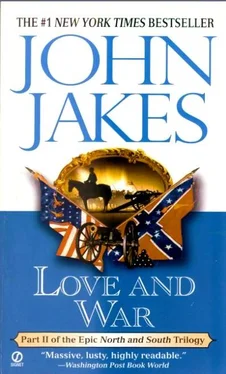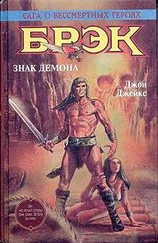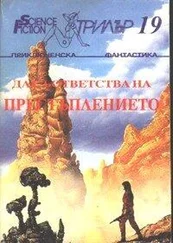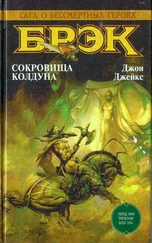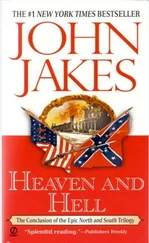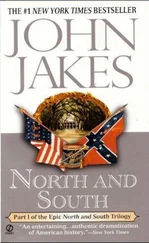Late yesterday, he had picked up his orders at the office of old General Totten, the chief of engineers. Brevet First Lieutenant William Hazard was assigned to the Department of Washington and instructed to report to a Captain Melancthon Elijah Farmer for temporary duty until his regular unit, Company A — all there was of the United States Army Corps of Engineers — returned from another project. Billy had missed the departure of Company A because he'd been recuperating at his home in Lehigh Station, Pennsylvania, where he'd taken his new bride, Brett. He'd married her at the Main plantation in South Carolina and then nearly been murdered for it by one of her former suitors.
Charles Main had saved his life. Billy's left arm occasionally ached from the derringer ball that could have killed him but didn't. The ache served a useful purpose. It reminded him that he would forever be Charles Main's debtor. That was true even though the friends had taken opposite sides in this peculiar, half-unwanted, still-unstarted war.
The breakfast had appeased his hunger, but it hadn't relieved his foreboding. Billy was a good engineer. He excelled in mathematics and liked the predictability of equations and such things as standard recipes for construction mortar. Now he faced a future neither neat nor predictable.
What's more, he faced it in isolation. He was cut off from his fellow engineers; from his wife, whom he loved deeply; and, by choice, from one of his older brothers. Stanley Hazard lived in the city with his disagreeable wife, Isabel, and their twin sons. Stanley had been taken along to the War Department by his political mentor, Simon Cameron.
Billy loved his older brother George, but toward Stanley he felt a certain nameless ambiguity that had no respect in it but plenty of guilt, and — shamefully — no affection. He didn't know a single person in Washington, but that wouldn't force him to see Stanley. In fact, he'd chosen to eat breakfast here at the National Hotel because a large part of its clientele was still pro-Southern, and there was little chance of encountering Stanley, who was anything but.
He paid his bill and handed a tip to the waiter. "Thank you, sir — thank you. That's much more than I ever get from all those cheap Westerners traipsing into town to get jobs from their nigger-loving President. Luckily, we don't get many of the Western crowd here. They scarcely drink, I doubt they fornicate, and they all carry their own bags. Some of my friends at other hotels can't earn —"
Billy walked away from the complainer, whose accent suggested he'd migrated from a Southern or border state. There seemed to be plenty like him in the capital. Yankees, but only nominally. If the city fell, as well it might, they'd be in the streets waving the Stars and Bars to welcome Jeff Davis.
Outside, on the corner of Sixth and Pennsylvania, he discovered that the muggy gray sky had produced a drizzle. He put on his dress hat of black felt; one side of its braided brim was turned up against the crown and held by a bright brass eagle. The drizzle wouldn't impede a brisk walk.
Billy, a year older than his friend Charles, was a powerfully built young man with the dark hair and pale, icy eyes that ran in the Hazard family. A blunt chin lent him an air of dependability, a look of strength. He'd recently succumbed to the new craze for mustaches; his, from which he now flicked a crumb of breakfast roll, was almost black, thick and darker than his hair.
Since Billy suspected this Captain Farmer of being a political appointee, he wasn't anxious to report early. He decided to spend a few more hours exploring the city — the parts of it well removed from the north side of Pennsylvania Avenue, the respectable, fashionable side.
He soon regretted his decision. War had swollen the town's population of forty thousand to three times that number. You couldn't cross a main street without dodging omnibuses, rowdy soldiers reeling drunk, teamsters beating and cursing their mules, Hash gentlemen slipping up to whisper the address of some quack who cured the French pox in twenty-four hours — even stray hogs or a flock of noisy geese.
Worse, the town smelled. The worst odors came from sewage floating in slimy lumps in the City Canal, which Billy came upon by walking straight south on Third. He paused on one of the footbridges leading across to the southwest section known as the Island. He looked down on someone's dead terrier floating among spoiled lettuce leaves and excrement.
He reswallowed some bit of his breakfast and got away fast, heading east to the Capitol, which still lacked its dome. Soldiers and politicians swarmed on the grounds and along the porticoes. Workmen scurried around stacks of lumber, piles of iron plates, and huge blocks of marble littering the area; Billy rounded the corner of one such block and bumped into an old overweight whore in dirty velvet and feathers. She offered him a choice of herself or her gray-faced daughter, no more than fourteen, who huddled at her side.
Billy strove to be polite. "Ma'am, I have a wife in Pennsylvania."
The whore failed to appreciate the courtesy. "Kiss my ass, shoulder straps," she said as he walked on. He laughed, but not heartily.
A few minutes later he gazed across the canal to the weeds around the monument to President Washington, unfinished due to a lack of interest and subscriptions. A cattle herd pastured near the forlorn obelisk. The drizzle turned to rain, fell harder, so he gave up. He struggled past some noncoms loudly singing "Sweet Evelina" and headed north across the avenue into the crowded area where he'd taken a boardinghouse room. On the way, he bought a copybook at a stationer's, paying for it with silver half-dimes.
Later, while twilight deepened, he whittled a point on a pencil. In shirt sleeves, he bent over the first blank page of his copybook lit by a lamp whose flame never wavered in the heavy air. He inscribed the day and date, then wrote:
My dear wife — I begin this journal, and will keep it, to let you know what I have done, other than miss you constantly, on this day and those to come. Today I explored the national capital — not a pleasant or heartening experience, for reasons which delicacy prevents me from conveying to this page —
Thinking of Brett — her face, her hands, her ardor in the privacy of their bed — he felt the physical need of her. He closed his eyes a moment. When he was again in control, he scribbled on.
The city is already heavily fortified, which I would take as a sign of a long war were there not such a pervasive general opinion that it will be short. A short war is greatly to be desired for many reasons — not the least of which is the most obvious, viz., my desire for us to live together as husband and wife wherever duty takes me in time of peace. Speaking not of personal matters but political ones, however, a war of short duration will make it easier to restore things as they were. Today on a public thoroughfare I encountered a negro — either a freedman or a contraband, General Butler's term for a Southern runaway. The black man would not vacate the sidewalk to permit me to pass. Memory of the incident has unsettled me all day. I am as fervent as any citizen about ending the disgrace of slavery, but the black man's liberty is not license. Although I know my long-lost sister would contradict me, I do not consider myself unjust or immoral for holding that belief. To the contrary — I feel I reflect a majority view. Speaking only of the army, I know that to be absolutely true. It is said that even our President still speaks of the urgent need to resettle freed blacks to Liberia. Hence my fear of a protracted war, which could well bring the havoc of too many rapid changes in the social order.
He stopped, pencil poised on the same level as the steady flame. How wet, how weighty the air felt; drawing deep breaths took great effort.
Читать дальше
